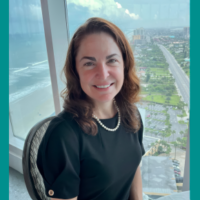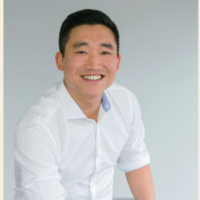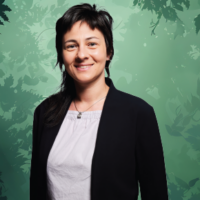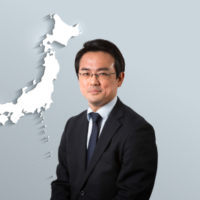
ACAMS Today interviewed Justine Walker, ACAMS’ head of global sanctions and risk, about her career in anti-financial crime (AFC) and what she enjoys about working at ACAMS. Until December 2019, Walker was the director of sanctions policy at UK Finance. The former chair of the European Banking Federation Sanctions Expert Group, a position she held from 2015 until December 2019, Walker has held specialist policy positions in the United Kingdom (U.K.) at the Financial Services Authority (the predecessor of the Financial Conduct Authority) and the Treasury’s counter-terrorist and proliferation financing branch. She has further acted as an International Monetary Fund advisor on the Nigerian anti-money laundering (AML) and counter-terrorist financing capacity-building program. While based in Central Asia with the United Nations (U.N.), she also worked on programs surrounding weapons and drug trafficking, corruption and terrorist financing, and has served as a national expert on financing of weapons of mass destruction matters.
Walker has extensive experience working with foreign governments, international bodies and financial institutions (FIs) on cross-border sanctions matters. This includes acting as an independent expert to the U.N. and other bodies on the promotion of payment channels in support of permissible international humanitarian activity within sanctioned and fragile jurisdictions, particularly Syria. On behalf of the Alliance for Financial Inclusion and under the auspices of the German G20 presidency, she prepared the special report on financial access for forcibly displaced persons.
Within ACAMS, Walker is tasked with leading critical industry and public-sector relationships, including engagement with key international bodies and think tanks. She holds a Ph.D. from the University of St. Andrews and an M.S. from the University of Edinburgh.
ACAMS Today: What drew you to a career in AFC and sanctions in particular?
Justine Walker: I was working in a role in Scotland covering drugs misuse and the policy on drugs misuse, including the response from law enforcement, the social response, rehabilitation, working with parents who were drug users, working on support for their children and so on. I was always interested in the international side of the drug trade, so I was very lucky to secure a position on this with the U.N. in central Asia. That role is what really what took me into the financial crime space because when you start to work with drug trafficking issues and the harm on communities and individuals, you start to deal with the finances behind this crime. What does that level of criminality mean for governments, for stability at the state level and for organizations’ stability?
When I was working in central Asia, I was dealing with the drug trade across the entirety of trafficking and inception issues, but also looking at the funding from the drug trade and how that was being utilized by all warring parties. My Ph.D. focuses on Central Asia and the interrelationship between drug trafficking and insurgency finances. That led me into the insurgency and counterterrorism sector, looking at the movement of drugs and the related funds, how that money was laundered, and how local corruption and state corruption were impacted. I continued doing that for a number of years, then I returned to the U.K. and started working with the financial regulator on international financial crime issues.
An opportunity then arose to move into a specialist government role where I was tasked with developing counterproliferation and counterterrorism strategies. This led to a national expert role with a European project on counterproliferation financing. During this period, I was part of the U.K. delegation to the Financial Action Task Force (FATF) and contributed to numerous FATF reports. I was also head of the U.K. delegation to the Eurasian Group, a FATF-style regional body. Being head of delegation sounds very grand but at that point I was the only U.K. attendee! That was the road map I followed into financial crime and sanctions.
I have been fortunate to be in the right place at the right time and build that expertise. But I have also really valued the opportunity to look at these issues from different perspectives. I started from a community perspective, looking at the impact of drugs on communities, then I evolved into looking at that at the source level. What does the opium trade mean for communities, local governments, corruption? What is the international dimension and connection with the global financial system? Then there is the whole nexus of fragile states, conflict states, terrorism. I have been very privileged to look at that from a western point of view but also to spend time in countries that are on the ground fighting this and understanding what that really means for those countries. Sometimes, the policy at the international level does not translate the way you think it would or should translate and the impact can be quite different. This holds true whether you are talking about drug trafficking, counterextremism, AML and so forth.
AT: What does a typical workday entail for you and what do you enjoy most about the job so far?
JW: The first thing I always do when I wake up, much to the annoyance of all my family, is look at the news. I am obsessive about looking at what is happening in the world. For my job, you must understand what is happening in the geopolitical risk environment and how that may influence your work over the next few months. So, the job can be quite fluid depending on what we are working with at a particular time.
What I really enjoy about the job is the global nature and the enthusiasm from the community to deal with these issues. I also enjoy working through a lot of the thinking and the challenging issues of sanctions implementation. This includes working across a diverse sector of stakeholders to look at what this means from an implementation point of view and holding dialogue with governments, FIs, corporations and humanitarian actors on how this is being implemented, what it means and identifying the challenges.
Everything with sanctions is so fluid and can change quite dramatically, which I just love. You can never sit back and relax, you can never be complacent, you must really look and try to understand the detail around them and the potential impacts. Quite often sanctions impact in ways no one considered.
The other aspect of the job is being in the global role, looking at the same issue from different parts of the world and managing that global dimension. It is something I appreciate having the opportunity to do.
AT: Could you share the industry and public-sector partnerships you have been leading with ACAMS?
JW: By way of setting up the international taskforce, we have been trying to bring together a key group of cross-industry experts to work on some major thematic issues. For example, a group was set up to begin looking at the work with the maritime industry and what it means for compliance, whether you represent a bank, a flag registry or a commodities trader. The sanctions advisory and expectations around the maritime industry have really grown. Now, we are unpacking the new norm and what implementation will look like across different sectors. That has been a significant piece of work. It has also been fun, bringing in different stakeholders―energy companies, shipping companies, banks―and getting them all at the table. Hearing different stakeholders’ views on the same issue and then finding the common ground can be a quite fascinating.
Another aspect that we have been working on has been around the humanitarian space by way of bringing together a whole different set of stakeholders, including the U.N. This has come to the forefront because of COVID-19 and the need to ensure the movement of certain humanitarian goods, like medical equipment, to Iran, Venezuela or Syria. We have also been looking at what that means for longer-term projects.
In June I was honored to present at the U.N. to the Counter-Terrorism Committee Executive Directorate and have the Assistant Secretary General chair that meeting. I presented on the “Risk Management Principles Guide for Sending Humanitarian Funds into Syria and Similar High Risk Jurisdictions,” which I published in May with the backing of the European Commission, U.K. Department for International Development, Swiss government and the World Bank. Securing the backing of these organizations, plus bringing together all the stakeholders involved, took many years of collaborative effort. A lot of dedicated individuals have been involved with this journey and it was a highlight for me to present.
More broadly, we are also working on a range of areas around proliferation financing. We have been looking at the next stage of the Royal United Services Institute and ACAMS proliferation financing study and how to make counterproliferation financing controls more effective. Given my background in this area, I often look at the issue through a very operational lens. Many of the issues that we are discussing now are still the same issues from when I was in government but what has significantly changed is the technology and how access to information now is greater than what it was 10 to 15 years ago. How do you manage the new challenges of having access to so much information, what is important in all that information and how do you interpret it?
We are also trying to build up a greater ability for public-private sector dialogue. What are the areas within sanctions programs that are not well understood? What are the areas where it just does not seem that the guidance given on a certain program reflects the intended objectives of that program? We are trying to bring together the public and private stakeholders to look at what is required, what is meant and help those imposing sanctions understand how they are being interpreted on the ground. ACAMS does not take any view on whether individual sanctions regimes are correct or not. What we try to do is educate our members on what these sanctions mean by way of practical implementation.
Beyond that, there is a lot on general control frameworks, whether it is sanctions screening, risk assessment or audit. That is an ongoing piece of work, so there are some individual workstreams and then there are some ongoing pieces of work.
AT: Do you have any tips for our members on how to navigate sanctions in 2020?
JW: My first tip is you must make sure the basics are there. So much of sanctions now is reliant on having the correct due diligence framework in place, knowing what lines of business your customers are in, knowing where they are geographically exposed and understanding how you may be indirectly impacted by sanctions. One of the first steps is making sure the nuts and bolts are there, similar to any other element of financial crime, and that they are working sufficiently. If you do not have good information in your systems, you are often not able to utilize that information to know your exposure. There is an element of making sure your core financial controls are robust enough and of course that is across the board.
To anybody with a global footprint, be mindful of how you manage conflict and cross-border sensitivities
Another aspect is understanding how you are going to keep up with the scale and pace of change. The pace of sanctions now can be so quick, it is so linked to the wider geopolitical situation, you must ensure that you are interpreting that situation and you are looking at where your exposure may be. This depends on the type of institution. For example, if you are a global institution, your exposure will often be downstream or through your customers’ business portfolio. Understand where your downstream risk is and how to navigate that. I would also advise ensuring that the core controls are sufficient and that the information you hold is updated. Also, be very clear with how you are going to manage horizon sanctions and changes to sanctions regimes that can be very dramatic.
To anybody with a global footprint, be mindful of how you manage conflict and cross-border sensitivities. You need to be clear that you are managing your regulatory obligations across the world. This is not as straightforward as it was a couple of years ago.
The final element to consider is that up until a couple of years ago, many FIs would just withdraw from a sanctioned environment and wouldn’t do business with a sanctioned country or a sanctioned individual. But now the merger between what is and is not permissible is a lot more difficult to navigate. It can be virtually impossible to isolate yourself from major economies with potential sanctions considerations, so you need to have a much more sophisticated framework. What we had five years ago does not reflect what we now require so you need to ensure that your framework and internal controls have evolved with the scale and pace of sanctions changes.
AT: When you are off the clock, what do you like to do in your spare time?
JW: I am an outdoors person―I kayak, I ski and I have a passion for horses.
Interviewed by: Stephanie Trejos, CAMS, associate editor, ACAMS, strejos@acams.org










